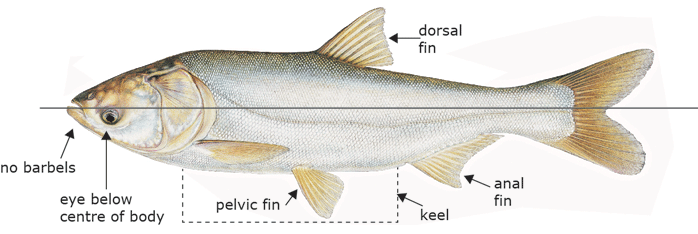Silver Carp
Hypophthalmichthys molitrix
Report it
If you think you have found an aquatic invasive species:
- do not return the species to the water
- take photos
- note:
- the exact location (GPS coordinates)
- the observation date
- identifying features
- contact us to report it
Silver Carp has a large, scaleless head, and a terminal, toothless mouth without barbels. Its eyes lie below the centre line of its body. Closely related and similiar to the Bighead Carp, Silver Carp tends to be narrower in shape. It is greyish-black on top, olive to silver-shaded on its sides and silver underneath, and has small, curved scales. Individuals can grow to more than 40 kilograms, lengths over 1.2 metres, and lives between 15 to 20 years. Gill-rakers are long, thin, fused, porous, and sponge-like, adapted specifically to filter phytoplankton, the microscopic plants on which it feeds. Silver and Bighead carps have been known to hybridize. Silver Carp is perhaps best known for its startle response, sometimes leaping as high as three metres above the water surface when disturbed by boat motors or other noise.
For more information, please visit:
- Canadian Science Advisory Secretariat (CSAS) Publications
- Asian Carp - Fact Sheet
- Asian Carp Program – Silver Carp website
- Biological Synopsis of Bighead Carp (Hypophthalmichthys nobilis) and Silver Carp (H. molitrix)
- Annotated bibliography of Bighead (Hypophthalmichthys nobilis) and Silver (Hypophthalmichthys molitrix) carps from Russian-Language literature
- Date modified:
